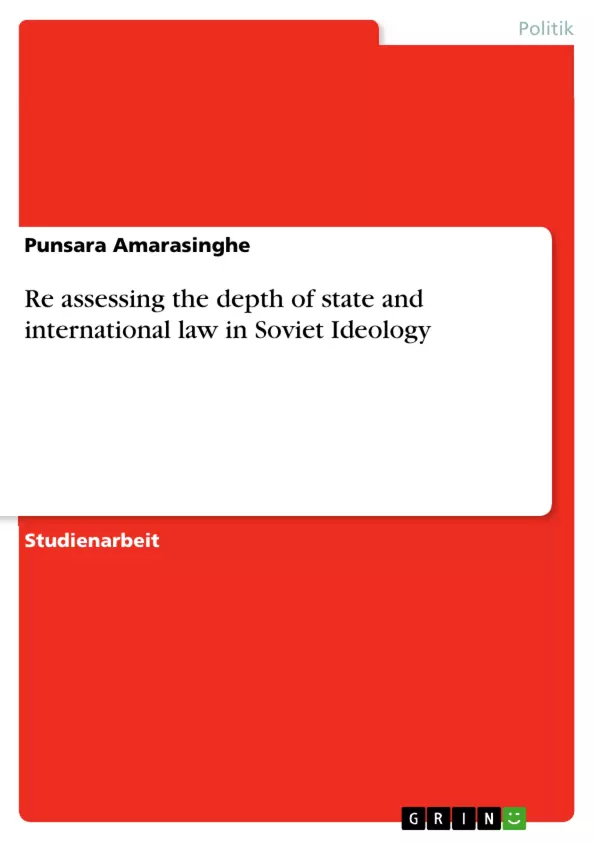This article seeks to examine how concept of state and international law have been ascertained and assimilated into practice in Soviet Union despite having a fervent ideological opposition to the said concepts. Furthermore objective of this article lies in examining the contribution made by major Soviet jurists to the realm of international law and in order to comprehend the scope of state and place of international law in Soviet Union, this article has made a historical observation. Results emerging from this article could be utilized in appreciating the scholarly contribution of USSR to international law and at the same time this article has unveiled anomalies existed between Marxian doctrine and Soviet practice on law and state.
Inhaltsverzeichnis
- The events took place in 1917 October Russia disrupted the myth of impossibility of creating a proletarian state
- In tracing the conception of state from Soviet perspective, it should be understood that cardinal understanding of state is imbued with the Marxian dogma of state
- However the incongruity of Marxian idea of withering away of state began to appear in the dawn of USSR as world first socialist state as its approach to conception of state was paradoxical at outset from what Engels propounded
- The continuity of state after revolution and the conceptual approach to state in Soviet doctrine saw many challenges as it began negate itself from original idea of Marxism
- In examining the Soviet attitude to state that it is important to observe the two ideological differences displayed by two grand jurists of early Soviet era Korovin and Pashukanis
Zielsetzung und Themenschwerpunkte
Dieser Artikel untersucht, wie das Konzept des Staates und des Völkerrechts in der Sowjetunion trotz heftiger ideologischer Opposition gegen diese Konzepte in der Praxis umgesetzt wurde. Darüber hinaus befasst sich der Artikel mit dem Beitrag bedeutender sowjetischer Juristen zum Völkerrecht und analysiert mithilfe einer historischen Betrachtung den Umfang und die Bedeutung des Staates und des Völkerrechts in der Sowjetunion.
- Die Rolle des Marxismus-Leninismus in der sowjetischen Staats- und Rechtsdoktrin
- Die Entwicklung des sowjetischen Staatskonzepts nach der Revolution
- Die Rolle des Völkerrechts in den Beziehungen der Sowjetunion zu anderen Staaten
- Der Einfluss der sowjetischen Doktrin auf die internationale Rechtsentwicklung
- Die Widersprüche zwischen der sowjetischen Praxis und der marxistischen Theorie
Zusammenfassung der Kapitel
- Das erste Kapitel untersucht die historischen Hintergründe und die Entstehung der Sowjetunion sowie die Besonderheiten des sowjetischen Staats- und Rechtskonzepts im Vergleich zu westlichen Demokratien.
- Das zweite Kapitel beleuchtet die marxistische Staatsdoktrin und ihre Umsetzung in der sowjetischen Praxis. Hierbei werden die Konzepte von Lenin und Stalin sowie ihre Interpretation des „verwelkenden Staates“ analysiert.
- Das dritte Kapitel untersucht die sowjetische Haltung zum Völkerrecht und den internationalen Beziehungen. Es werden die Positionen prominenter sowjetischer Juristen wie Korovin und Pashukanis sowie ihre unterschiedlichen Ansichten zum Verhältnis des Staates zum internationalen Recht vorgestellt.
Schlüsselwörter
Der Artikel konzentriert sich auf die sowjetische Staats- und Rechtsdoktrin, den Einfluss des Marxismus-Leninismus auf die Rechtsentwicklung in der Sowjetunion, die Rolle des Völkerrechts im Kontext des sowjetischen Staates und die Herausforderungen der internationalen Beziehungen zwischen der Sowjetunion und anderen Staaten.
Häufig gestellte Fragen
Wie vereinbarte die Sowjetunion den Staatsbegriff mit der marxistischen Theorie?
Trotz der Theorie vom „Absterben des Staates“ festigte die Sowjetunion ihre staatlichen Strukturen massiv, was zu einem ideologischen Paradoxon führte.
Welche Rolle spielte das Völkerrecht in der sowjetischen Ideologie?
Das Völkerrecht wurde pragmatisch genutzt, um die Beziehungen zu kapitalistischen Staaten zu regeln, obwohl es ideologisch als bürgerliches Konstrukt abgelehnt wurde.
Wer waren Korovin und Pashukanis?
Es waren zwei bedeutende sowjetische Juristen, die unterschiedliche Theorien zur Rolle des Rechts und des Staates im Sozialismus entwickelten.
Was war der Beitrag der UdSSR zur internationalen Rechtsentwicklung?
Die Sowjetunion beeinflusste das Völkerrecht durch ihre Konzepte der friedlichen Koexistenz und ihre spezifische Interpretation von Souveränität.
Gab es Widersprüche zwischen Marx’ Lehre und der sowjetischen Praxis?
Ja, insbesondere die Fortexistenz eines starken Machtapparates widersprach Engels’ Prophezeiung vom Ende des Staates nach der proletarischen Revolution.
- Quote paper
- Punsara Amarasinghe (Author), 2019, Re assessing the depth of state and international law in Soviet Ideology, Munich, GRIN Verlag, https://www.grin.com/document/489809



